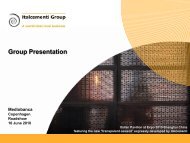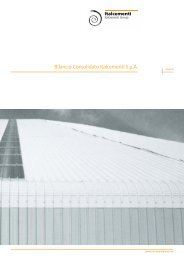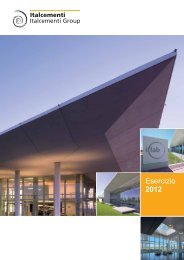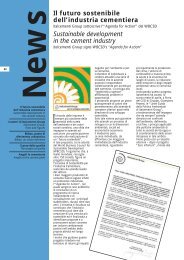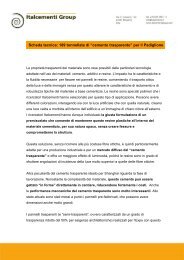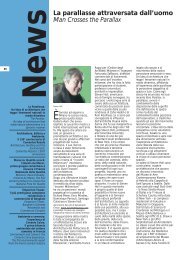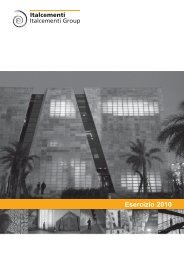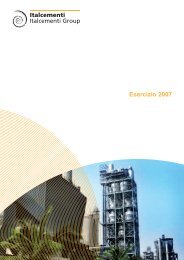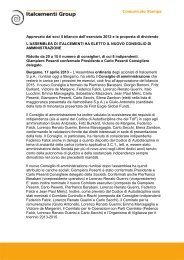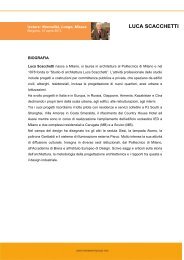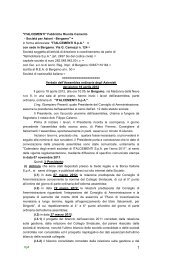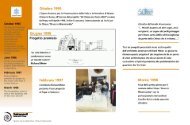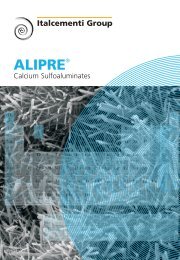2012 Annual Report - Italcementi Group
2012 Annual Report - Italcementi Group
2012 Annual Report - Italcementi Group
Create successful ePaper yourself
Turn your PDF publications into a flip-book with our unique Google optimized e-Paper software.
Moreover, the ‘Code of Conduct’ envisages that ‘Relevant persons’ must abstain from performing transactions<br />
that are subject to disclosure to the Company:<br />
* during the 30 calendar days preceding the meeting of the Company’s Board of Directors called to approve<br />
the full-year and half-year financial statements, including the day on which the meeting is held;<br />
* during the 15 calendar days preceding the meeting of the Company’s Board of Directors called to approve<br />
the quarterly reports, including the day on which the meeting is held.<br />
INTERESTS OF DIRECTORS AND TRANSACTIONS WITH RELATED PARTIES<br />
On November 5, 2010, based on the positive opinion of the specifically appointed Committee for Transactions<br />
with Related Parties, the Company’s Board of Directors adopted a procedure for transactions with related<br />
parties envisaged by the CONSOB Regulation of March 12, 2010 (the “Procedure”).<br />
The Procedure, in compliance also with art. 2391-bis of the Italian Civil Code, sets out the measures adopted<br />
by the Company to ensure that transactions undertaken with related parties, whether directly or through<br />
subsidiaries, are carried out transparently and in compliance with criteria of substantial and procedural<br />
correctness.<br />
In particular, with the exception of some situations which are described below, the Procedure provides for the<br />
authorization process and the disclosure requirements for transactions between i) a party related to<br />
<strong>Italcementi</strong>, on the one hand, and ii) <strong>Italcementi</strong>, on the other, or one of its subsidiaries when, before<br />
completing the transaction, the prior examination or authorization by a corporate body of <strong>Italcementi</strong> or by an<br />
officer of <strong>Italcementi</strong> with relevant delegated powers is required. The Procedure also applies to transactions<br />
undertaken by <strong>Italcementi</strong> with a subsidiary or associated company, as well as between its subsidiaries, when<br />
the transaction involves significant interests of a related party of <strong>Italcementi</strong>.<br />
The Procedure distinguishes “significant” transactions from “minor” transactions on the basis of specific<br />
quantitative criteria predetermined by CONSOB. This distinction is also relevant for determining applicable<br />
rules on transparency, which are simplified for minor transactions and more stringent for significant<br />
transactions, although both envisage the prior opinion of the Committee for Transactions with Related Parties.<br />
The Committee has:<br />
- the duty to give and explain its opinion on both minor (non-binding opinion) and significant (binding opinion)<br />
transactions;<br />
- the right, for significant transactions, to take part in the negotiations and in the preliminary investigation stage<br />
through the receipt of a complete and prompt information flow, and the right to ask for information and to<br />
submit its remarks to the delegated bodies and to those in charge of the negotiations or the preliminary<br />
investigation;<br />
- the right to seek the assistance, at the Company’s expense, of independent experts of its choosing.<br />
In the case of minor transactions, the Procedure envisages the right, in any case, to execute the transaction<br />
even if the Committee for Transactions with Related Parties expresses a negative opinion, provided that this is<br />
disclosed to the market through a specific document setting out the reasons for such divergence.<br />
Moreover, the Company By-laws provide that (i) significant transactions with related parties can be performed<br />
despite the negative opinion of the Committee for Transactions with Related Parties provided that the<br />
execution of such transactions is authorized by the Shareholders’ Meeting on condition that the majority of<br />
non-related shareholders do not cast a vote contrary to performance of the transaction and the non-related<br />
shareholders present at the Shareholders’ Meeting represent at least 10% of the share capital with voting<br />
rights (so called whitewash); and that (ii) the Company may apply the simplified rules in cases of urgency<br />
unless the transaction is under the prerogatives of the Shareholders’ Meeting and requires its authorization.<br />
198



